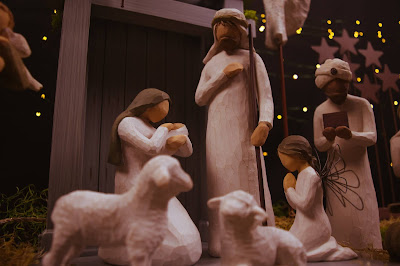The word Carol means dance or a song of praise and joy. Carols used to be written and sung during all four seasons, but only the tradition of singing them at Christmas has really survived. Carols were first sung in Europe thousands of years ago, but these were pagan songs, sung at the Winter Solstice celebrations as people danced round stone circles.
In 1223 St. Francis of Assisi initiated nativity plays in Italy, with people in the plays singing songs or 'canticles' that told the story. Sometimes, the choruses of these new carols were in Latin; but normally they were all in a language that the people watching the play could understand and join in. The new carols spread to France, Spain, Germany and other European countries.
Carols from this time were very loosely based on the Christmas story and were seen as entertaining rather than religious songs. Usually sung in homes rather than in churches, they evolved over time. Traveling singers or Minstrels started singing these carols and the words were changed for the local people wherever they were traveling. "
I Saw Three Ships" is an example.
Carols remained mainly unsung until Victorian times, when two men called William Sandys and Davis Gilbert collected Christmas music from villages in England. Sandy's compiled
"Christmas Carols, Ancient and Modern" which is now in the British Library. In the lengthy introduction Sandys relates the history of the festival, bemoans that celebrating Christmas is ‘on the wane’ . He includes 80 carols, some 15th to
17th century, others ‘still used in the west of England’, plus 12 pages of music with 18 tunes. The book saw the first appearance of many now-familiar carols, including 'God rest you merry, Gentlemen'; 'Hark, the herald angels sing'; 'I saw three ships'; and 'The first Noel'. (In 1852 Sandys published a similar carol collection, Christmas-tide, for a more popular market.)
Waits
Before carol singing in public became popular, there were official carol singers called 'Waits'. These were led by important local leaders who had the only power locally to permit payment for wassailing or carolling. 'Waits' were so called because they only sang on Christmas Eve which was sometimes known as 'watchnight' or 'waitnight', because of the shepherds were watching their sheep when the angels appeared to them.
Each Christmas carol tells a story, here is the history of two of the best known:-
Once in Royal David's City
Cecil Frances Alexander lived 1818-1895 in Dublin, Ireland. She was the author of the iconic "Once in Royal David's City" (and "All things Bright and Beautiful" amongst many others). She was a prolific verse writer, her hymns heavily influenced first by Dr. Walter Hook, Dean of Chichester, and later her connections within the Oxford Movement.
Whilst many of us are unfamiliar with the controversies surrounding both the Movement and Alexander's endorsement of the class system, her hymns are known and loved by Christians the world over. Alexander also published poetry in english and french, for adults and children.
"Once in Royal" as it's affectionately known is usually sung at the start of Carol Services in the approach to Christmas, and the Nine Lessons and Carols service on Christmas Eve. The first verse is usually sung as a solo, the soloist traditionally only learning they are singing it moments beforehand!
Hark the Herald Angels Sing
Charles Wesley, the founder of Methodist Church wrote a beautiful carol which began:-
Hark how all the welkin rings
Glory to the King of Kings
Peace on earth and mercy mild
God and sinners reconciled.
Until twenty years later a preacher called George Whitfield published a new version with the now familiar first line "Hark, the herald angels sing Glory to the new-born King!" Wesley was apparently unimpressed, not least (according to a BBC Culture article) because the angels in the Bible spoke their message, rather than sang it. The text is still credited to Wesley, who wrote over 6500 hymns!
The history around the tune is even more interesting. It is by Mendelssohn; a song he wrote to commemorate the Gutenburg press 400 years after its invention. Realising some new lyrics might be needed once the anniversary had passed, Mendelssohn said he did not mind what words were substituted for the original lyrics, as long as they were not religious....
Here is our choir singing Ben Parry's version of "Adam lay Ybounden":-
(press the triangular "play" button at the bottom)






